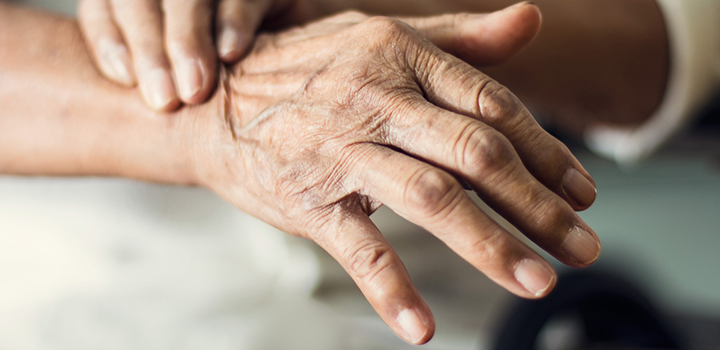Boost for UEA research on skin microbiome and healthy aging
By: News archive

Researchers at the University of East Anglia are set to receive a share of £2 million, announced by the government today to tackle healthy ageing.
Diverse groupings of researchers will study how to increase healthy lifespan and quality of life in old age and address health inequalities, across 11 new networks – thanks to funding from the Biotechnology and Biological Sciences Research Council (BBSRC) and the Medical Research Council (MRC).
Researchers at UEA will focus on how people’s skin microbiome is involved in healthy aging, in a new network led by the University of Bradford in collaboration with Queen Mary University of London, the University of Manchester and the University of Liverpool.
Dr Jelena Gavrilovic, from UEA’s School of Biological Sciences, said: “Our skin is home to millions of microbes, which are usually ‘friendly’ - providing protection from infection by forming a shield against the invasion of disease-causing microbes into the body.
“The composition of the microbes alters with age, alongside changes to the skin such as thinning and dryness. The very elderly can suffer from chronically infected wounds which are resistant to treatment. And the hormonal changes of menopause cause alterations in the skin and its microbiome.
“This network aims to bring together skin scientists and microbiologists, clinicians and industry to better understand and target changes in the skin microbiome with ageing.
"This a very exciting development for Norwich Skin Platform co-founded by me with my colleague Dr Damon Bevan in the School of Biological Sciences, UEA and working with Prof Marc Moncrieff, Prof Ketan Dhatariya and Prof Jeremy Turner at the Norfolk and Norwich University Hospital, Prof Cathie Martin at the John Innes Centre and Prof Mark Webber at the Quadram Institute."
Prof Julie Thornton, from the University of Bradford, said: “We want to create a worldwide understanding of how ageing is influenced by skin bacteria.
“Recent studies have showed that the skin microbiome could be a more accurate predictor of chronological age than the gut microbiome.
“Although the gut microbiome has been extensively researched, and is known to impact ageing, there is little knowledge on the role of skin microbiome in ageing.
“This is why we have created the Skin Microbiome in Healthy Ageing (SMiHA) - a multi-disciplinary UK research community comprising of universities, industry, and healthcare practitioners, whose goal is to identify how changes in the composition of the skin microbiome reflect acceleration or deceleration of the ageing process and age specific disorders.
“Skin disorders occur from tiny infants to the very elderly and 50 per cent of the UK population suffer a microbiome associated skin complaint such as infant eczema or teenage acne each year.
“Management of infected wounds alone uses 5.5 per cent of total NHS expenditure and skin conditions are the most frequent reason for consultation in general practice.
“Poor skin health and chronic skin conditions, such as infected wounds, limits independence in the elderly population and represents a high economic burden. Without good skin health, day to day living is compromised.
“The network formed under the umbrella of this project will help to drive skin microbiome research towards intervening in age-related conditions and related systemic diseases through an expanded knowledge base from skin microbiome research.”
Prof Melanie Welham, Executive Chair of the Biotechnology and Biological Sciences Research Council (BBSRC), said: "At the heart of improved health and wellbeing is a deep, integrated understanding of the fundamental mechanisms that contribute to maintaining health across the full life course. An understanding that is underpinned by collaboration, partnerships and shared knowledge.
“By funding the Ageing Networks, we're not only addressing a major societal challenge - we're also stimulating multidisciplinary research and innovation, with the potential for some really exciting breakthroughs."
Prof John Iredale, interim Executive Chair of Medical Research Council (MRC), said: “How to keep people healthier as they live longer is one of the biggest challenges facing 21st century medicine and our society.
“To make greater progress we need to transform how we conduct ageing research – both by bringing together scientists from many disciplines with the public, clinicians, policymakers and industry.
“The new networks we’re funding will build UK-wide collaborations to better understand the fundamentals of ageing, paving the way towards the development of novel interventions to prevent, halt or reverse aberrant ageing.”
Related Articles

Michael Grange appointed as new Royal Society Entrepreneur in Residence
Michael Grange has been appointed as the new Royal Society Entrepreneur in Residence for the Faculty of Science, following in the footsteps of Dr Soraya Jones who previously held the role.
Read more
Ultra low frequency gravitational waves detected in space
Researchers at the University of East Anglia are part of an international team that have found evidence for ultra-low-frequency gravitational waves in space.
Read more
Study of Earth's stratosphere reduces uncertainty in future climate change
New research led by the University of East Anglia (UEA) reduces uncertainty in future climate change linked to the stratosphere, with important implications for life on Earth.
Read more